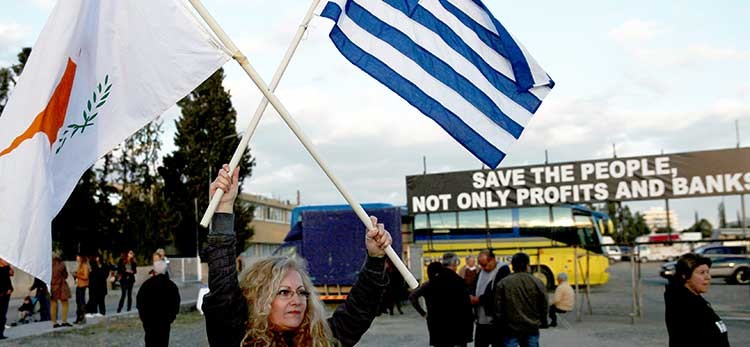Αναπτυξιακά Έργα
Cyprus shows restrictions are bearable

As Cyprus’s financial system imploded in the spring of 2013, the island’s leaders were given an ultimatum: sign up to a bailout deal or watch your banking system collapse.
The brief, painful drama that unfolded on the Mediterranean island led to the first capital controls in the euro zone to stem a bank run and stop money fleeing the country.
With Greeks pulling billions out of banks on fears that their country will default, the same drama risks being played out in Greece this time unless the leftist government clinches a last-ditch debt deal with international creditors this week.
Like Cyprus then, Greek banks are now relying on emergency liquidity assistance (ELA) authorised by the European Central Bank to cope with deposit outflows which accelerated last week as Athens and its lenders remained deadlocked..
For economist Michael Sarris there is little doubt what will happen if the ECB pulls the plug on Greece.
“Basically they would have to close in half an hour,” he told Reuters, referring to Greek banks.
He should know. As Cypriot finance minister in 2013, Sarris was forced into a deal contingent on winding down a bank on an ELA lifeline. A second bank was forced to raid its clients deposits to recapitalise, a process known as a ‘bail-in’.
Athens is similarly at risk of having its ELA funding cut if it fails to comply with European creditors’ demands and defaults on an International Monetary Fund repayment due by June 30.
Greeks pulled out more than 4 billion euros from the banking system last week, prompting the ECB to meet for a second time to raise the ELA ceiling. That will only keep the banks afloat until early this week when the decision will be reviewed again.
Greece’s government has strongly denied that it is planning capital controls.
ELA WARNING
The trigger in Cyprus, Sarris says, was lenders that warning ELA for Cyprus banks would be cut. Nicosia was forced to agree to conditions, and capital controls to prevent a bank run, since those deposits were needed to recapitalise the banks.
Two years later, capital controls have gone. That contrasts with Iceland, which is only just preparing to dismantle restrictions imposed after its own financial meltdown in 2008.
“They showed us a piece of paper saying they had a two-thirds majority on the governing council of the ECB,” Sarris recalls, referring to warnings of a cut to funding.
After a two-week shutdown, Cypriot banks reopened. Cash machines had remained in operation and were replenished regularly.
There were few queues and little fuss, a stiff upper lip trait islanders may have picked up from their former British colonial rulers.
After the two-week closure, a €300-a-day cap on cash withdrawals was initiated for individuals; business transactions over €5,000 per day needed central bank approval; credit card spending abroad was capped at €5,000 a month; and travellers could not export more than €1,000 at a time.
The IMF and the ECB wanted tougher restrictions. Cyprus stood its ground. Within weeks, foreign banks were decoupled from the controls, and a timetable for a staggered withdrawal of the restrictions was introduced.
“It was difficult, there was a shortage of liquidity and bureaucracy in moving capital around, but gradually we got used to it and the situation improved,” said Michalis Pilides, head of Cyprus’s main business organisation OEV.
“Both the state and banks introduced deep structural changes and that was instrumental in regaining trust which allowed controls to be relaxed,” he told Reuters.

 21/06/2015
21/06/2015






